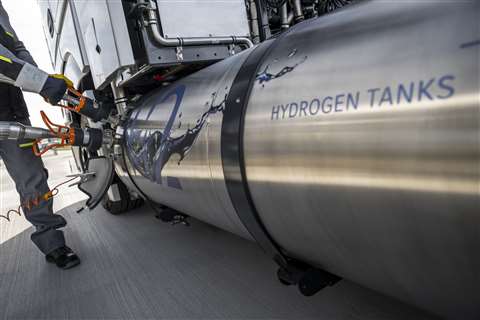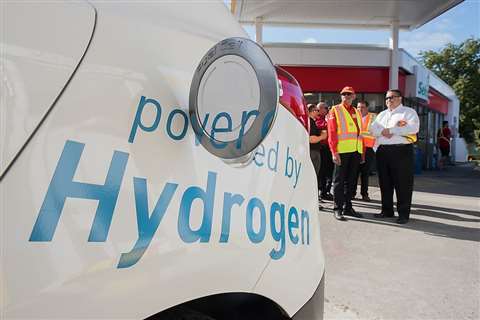U.S., Europe provide billions in funding to jumpstart hydrogen projects
23 September 2022
 The U.S. has opened up US$7 billion in available funding for hydrogen hubs, while the European Commission has approved €5.2bn for hydrogen-related projects. (Photo: Daimler Truck)
The U.S. has opened up US$7 billion in available funding for hydrogen hubs, while the European Commission has approved €5.2bn for hydrogen-related projects. (Photo: Daimler Truck)
On the same day it released draft guidance for a Clean Hydrogen Production Standard, the U.S. Department of Energy (DOE) announced the opening of applications for a US$7 billion program to create regional clean hydrogen hubs (H2Hubs) across the country. In quick succession, the European Commission announced its approval of state aid worth €5.2 billion for a second wave of hydrogen-related Important Projects of Common European Interest (IPCEI) to help reduce the region’s dependence on natural gas and accelerate the hydrogen economy.
The $7 billion in funding announced by the U.S. DOE is part of a larger $8 billion H2Hub program funded through the Bipartisan Infrastructure Law. In announcing its availability, the agency described the H2Hubs as a central driver in helping communities across the U.S. benefit from clean energy investments, while furthering the Biden Administration’s goal of a net-zero carbon economy by 2050.
“These H2Hubs are a once-in-a-generation opportunity to lay the foundation for the clean hydrogen future President Biden is building — one that will lift our economy, protect the planet and improve our health,” said U.S. Secretary of Energy Jennifer M. Granholm. “With input from America’s brightest scientists, engineers, community organizers and entrepreneurs, this national hydrogen strategy will help us accelerate the development and deployment of technologies to realize the full potential of clean hydrogen energy for generations to come.”
Projects funded are expected to include a Community Benefits Plan to:
- Support meaningful community and labor engagement;
- Invest in America’s workforce;
- Advance diversity, equity, inclusion, and accessibility; and
- Contribute to the President’s goal that 40% of the overall benefits of certain federal investments flow to disadvantaged communities.
For this initial funding opportunity launch, the DOE is aiming to select six to 10 hubs for a combined total of up to $7 billion in federal funding. Additional funding opportunities may follow to accelerate and expand the network of clean hydrogen projects.
Europe expands hydrogen investment
Across the pond, Hydrogen Europe, the European association representing the interest of the hydrogen industry and its stakeholders, lauded the approval of the €5.2bn in aid set aside by the European Commission for the IPCEI second wave (Hy2Use).
“We are delighted to see the second wave of IPCEI projects secure approval. These projects come at the perfect moment as we strive to reduce our dependence on fossil fuels,” said Jorgo Chatzimarkakis, CEO of Hydrogen Europe. “Given the importance of renewable hydrogen production, adequate storage and transport infrastructure to a future hydrogen market, we very much welcome the €5.2bn greenlit by the European Commission to support these projects.”
 Available funding will help jumpstart projects and potentially open up private investments in hydrogen-related projects and infrastructure. (Photo: Shell)
Available funding will help jumpstart projects and potentially open up private investments in hydrogen-related projects and infrastructure. (Photo: Shell)
The aid will support projects in two main areas:
- Hydrogen-related infrastructure, namely large-scale electrolyzers, totaling 3.5 GW for an annual output of 340000 tons of hydrogen, as well as infrastructure for the production, storage, and transport of renewable and low-carbon hydrogen.
- Innovative technologies for the integration of hydrogen into industrial processes in sectors such as steel, cement and glass.
Member states in the European Commission will provide the funding in support of 29 companies, including SMEs and start-ups, in the delivery of this wave. With this IPCEI, Europe will transition from early-stage support of key technologies to their scale up and deployment, the Hydrogen Council noted. It is the second of four IPCEIs that will channel funding from EU governments to companies. Hy2Tech, the first IPCEI, received state aid approval in July for up to €5.4 billion in public funding.
Both IPCEIs are expected to help mobilize additional private and public funding for further scale-up of renewable hydrogen production and use in the industrial sector, Chatzimarkakis predicted. “De-risking industry efforts remains a key challenge to secure the private investments needed to quickly reduce EU dependency from fossil fuels and speed up emission reductions. With two IPCEIs now notified, and more on the way, we expect increasingly ambitious cooperation between European member states.”
MAGAZINE
NEWSLETTER
CONNECT WITH THE TEAM






